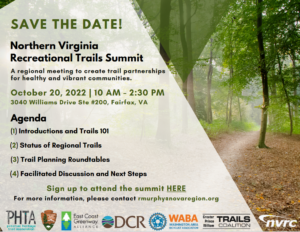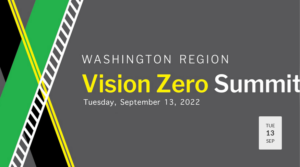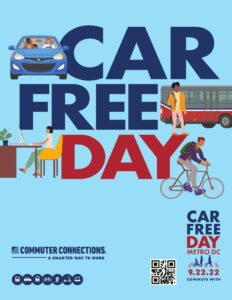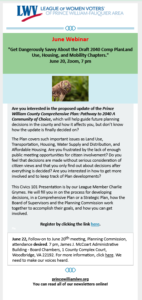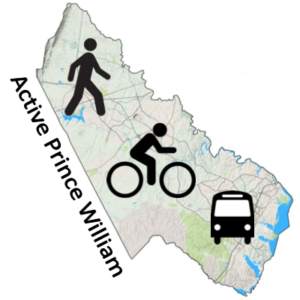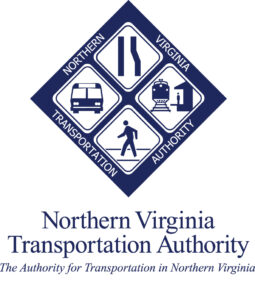
On July 11, 2022, Active Prince William joined 10 other advocacy organizations around Northern Virginia to send the following joint letter to the Northern Virginia Transportation Authority, three days before the Authority’s scheduled adoption of a two-year update to its Six-Year Program.
Coalition for Smarter Growth | Audubon Naturalist Society | Virginia Sierra Club |
Faith Alliance for Climate Solutions | Active Prince William | Sustainable Mobility for Arlington County |
Chesapeake Climate Action Network | Prince William Conservation Alliance |
Southern Environmental Law Center | YIMBYs of Northern Virginia |
Lewinsville Faith in Action
July 11, 2022
Honorable Phyllis Randall, Chair
Northern Virginia Transportation Authority
3040 Williams Drive, Suite 200
Fairfax, VA 22031
Re: Recommendations to further improve the proposed FY 22-27 Six-Year Program and process going forward
Chair Randall and NVTA board members:
The undersigned 11 organizations offer the following comments and recommendations that we urge you to adopt for the proposed FY 22-27 Six-Year Program coming before your vote this week. In summary:
- We support the overall direction taken by the staff and committees in their selections from the candidate project list to fund all transit and most station access and local complete street projects;
- However, we remain concerned that the slate of projects recommended for funding – and the original candidate list – show a program still too focused on road expansion;
- We ask for important changes to the proposed FY 22-27 funding allocations in Prince William County: fund the Old Centreville Rd Widening project (PWC-035) as an alternative to the proposed destructive Rt 28 bypass (Alt. 2B) along Flat Branch;
- For the next 6-year program cycle, NVTA needs to ensure that local jurisdiction project submissions better reflect adopted regional policies for climate change and equity; and
- NVTA’s process for the Six-Year Program should facilitate meaningful public involvement from the start, including requiring public hearings prior to local government candidate project submissions.
These points are elaborated on the following pages.
1. We support the overall direction taken by the staff and committees in their selections from the candidate project list.
● We applaud the selection and funding of all of the transit projects and most of the station access, local street grid and complete streets projects.
● We appreciate that many of these changes reflect attention to public feedback you received and the importance of these projects for a more sustainable and equitable future.
2. However, we remain concerned that the slate of projects recommended for funding – and the original candidate list – show a program still too focused on road expansion.
● 65% of the candidate project funding requested was for highway and roadway capacity expansion.
● 55% of the staff recommended project funding is for highway and roadway capacity expansion.
● These amounts are far too much given the other regional needs for safer streets, transit access, electrification, and climate resilience as well as improving our
transit, pedestrian and bicycle networks.
● This emphasis on road expansion also ignores the reality of induced demand, that widening roads is not a medium- or long-term solution for vehicle congestion, as shown in the Coalition for Smarter Growth’s On the Wrong Road in Northern Virginia report using the RMI Shift Calculator.
3. We ask for these important changes to the proposed FY 22-27 funding allocations in Prince William County:
● Support a better, less destructive Route 28 project in Prince William County by funding the Old Centreville Road Widening project (PWC-035) as an alternative to the Route 28 bypass (Alternative 2B) along Flat Branch. The four-laning of Old Centreville Road combined with VDOT’s recommended Centreville Road/Route 28 STARS improvement package could effectively serve as a “Modified Alternative 4” for Route 28.
○ This alternative project would avoid the adverse impacts to affordable homes in a low-income minority and immigrant community from the 28 Bypass project and would be compatible with walkable, transit-accessible economic development and neighborhood livability efforts in the existing Route 28 corridor.
● To accommodate this project, shift funding from other NVTA recommended Prince William projects.
4. For the next Six-Year Program cycle, NVTA needs to ensure that local jurisdiction project submissions better reflect adopted regional policies
● NVTA needs to require that local jurisdiction project submissions better reflect adopted regional policies to provide alternatives to driving and reduce car dependence, support transit-oriented land use, and achieve our equity and climate goals.
● Equity in transportation, a core value of NVTA, must address the disproportionate impact of unsafe streets, proximity to traffic and pollution, and high personal transportation costs that auto-dependence causes for low- and moderate-income residents and workers. The Region Forward vision plan recognizes this in its goal to lower combined transportation and housing costs and to also improve access to travel options and allow more residents to live in walkable regional activity centers with good transit. These measures also reduce travel demand on roads and highways helping those who must commute or access important services by car. NVTA needs to ensure that its member jurisdictions consider who benefits and who is harmed by transportation projects.
● The region’s Metropolitan Planning Organization, the National Capital Region Transportation Planning Board (TPB), just adopted a greenhouse gas reduction target of 50% for the on-road transportation sector. NVTA’s project selections should be tied to achieving those reductions. TPB’s climate change study showed that the region will need to reduce vehicle miles traveled of passenger vehicles by 15 to 20% below 2030 baseline forecasts, as well as rapidly adopt electric vehicles.
● Tackling climate change in transportation also provides more travel options, greater proximity to jobs and services, lasting congestion management, and addresses inequities for households and workers regarding street safety, air quality, walkable amenities, personal transportation costs, housing options, and access to transit and job locations. With new car payments now over $700 per month and gas at $5 per gallon, the need in Northern Virginia for more walkable, bikeable, transit-friendly, mixed-use and compact communities with affordable housing is greater than ever.
● Reducing per capita VMT – the need to drive for daily needs – by expanding transportation options, transit-oriented land use, and transportation demand management is also essential to meeting NVTA’s goal of reducing congestion.
5. NVTA’s process for the Six-Year Program should facilitate meaningful public involvement from the start, including local government candidate project submissions.
● Since project priorities are advanced early on by local governments, NVTA must ensure that there are accessible public engagement opportunities early on.
● NVTA should require that localities hold an advertised public hearing for NVTA project funding requests before the local governing body adopts its resolution of support for the application and before the projects are submitted to NVTA for funding consideration.
○ Currently some jurisdictions generate staff reports and the elected body approves the project submissions as a consent agenda item with no public hearing.
○ Public comments on proposed NVTA project submissions would be more meaningful and help inform the local government before each set of projects is submitted to the NVTA for the Six-Year Program update.
● In addition, NVTA coordinates the submissions for federal CMAQ and RSTP funds and for state SmartScale by Northern Virginia localities and should require similar transparency and public involvement before local governing bodies endorse those submissions.
Thank you for listening to stakeholders as you have carried out this process.
Sincerely,
Stewart Schwartz
Executive Director
Coalition for Smarter Growth
[email protected]
Renee Grebe
Northern Virginia Conservation Advocate
Audubon Naturalist Society
[email protected]
Douglas Stewart
Transportation Co-Chair
Virginia Sierra Club
[email protected]
Andrea McGimsey
Executive Director
Faith Alliance for Climate Solutions
[email protected]
Mark Scheufler & Allen Muchnick
Co-Chairs
Active Prince William
[email protected]
Chris Slatt
President
Sustainable Mobility for Arlington County
[email protected]
Zander Pellegrino
Northern Virginia Grassroots Organizer
Chesapeake Climate Action Network
[email protected]
Kim Hosen
Executive Director
Prince William Conservation Alliance
[email protected]
Morgan Butler
Senior Attorney
Southern Environmental Law Center
[email protected]
Luca Gattoni-Celli
Founder
YIMBYs of Northern Virginia
[email protected]
Jack Calhoun and John Clewett
Co-Chairs
Lewinsville Faith in Action
[email protected]
